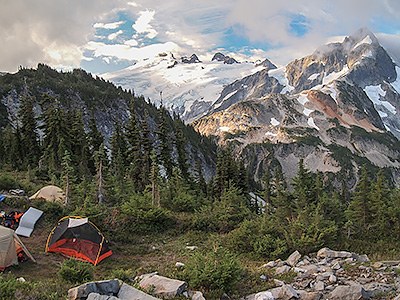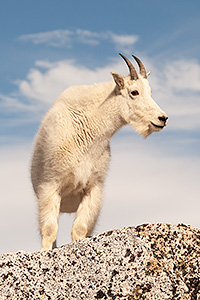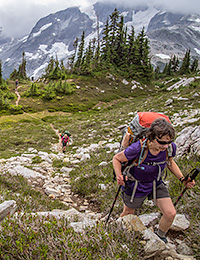
Backpacking Course
Basic Backpacking
Deepen your connection to the outdoors and visit beautiful areas beyond the reach of day hikes. Be ready by June to go on single-night and multi-night trips into the Northwest backcountry. For experienced day hikers.
- Wed, Apr 14, 2021 - Sun, Jun 20, 2021
- Committee: Seattle Backpacking Committee
- Members: $140.00
- Availability: FULL, 3 on waitlist (60 capacity)
- Cancellation & Refund Policy
(Click MORE+ to see the full description.)
This course is for people with recent hiking experience who want to start doing overnight trips safely and confidently into the Northwest backcountry, and for backpackers who wish to improve their knowledge. In addition to the core subjects of clothing, food, gear, and safety, the course also covers topics that are often of interest to first-time backpackers: animals you’re likely to see and how to act around them, social expectations on extended trips, staying comfortable in camp, staying connected with people back home. The course culminates in a student-only backpacking trip where everyone else will be new too, and it’s OK to have a few first-time hiccups. Upon completion of the course, students will have a strong foundation to enjoy many backpacking opportunities offered by The Mountaineers.
Though it takes more than one class to become a fully accomplished backpacker, this course takes you on the first step on that journey by preparing you to go on Mountaineers backpacking trips of up to three nights. The course begins in April and is designed to have you ready to go on Mountaineers trips in time for the peak local backpacking months of June through September.
This course is open to Mountaineers members only.
TOPICS COVERED IN THIS COURSE
BASIC Backpacking Gear and Skills
- Clothing and gear: what you need, what the options are, where to buy it, and how to use it. Options are presented at various price points, including options for used gear.
- Food and hydration: how to plan, prepare, pack, cook, and clean up.
- How to choose and pack your backpack, and tips for managing your gear.
Backpacking From a Home Base in Seattle
- Northwest wildlife: what to expect, and how to act safely and respectfully on overnight trips.
- Introduction to the wide variety of backpacking locations available Washington: alpine, subalpine, river valleys, canyons, beaches, inland deserts.
- Common destinations for Mountaineers backpacking trips in Washington.
- Destinations for Mountaineers backpacking trips beyond Washington: Oregon, Idaho, Wyoming, British Columbia, Alberta.
Backpacking With The Mountaineers
- How to find, choose, and register for Mountaineers backpacking trips.
- What to expect on a typical Mountaineers backpacking trip: from carpool, to trailhead, to camp, and back again.
- Etiquette before, during, and after a trip.
- The Expedition Mindset: what it means to be a club not a guide service.
- For 2021: Mountaineers COVID-19 Guidelines that affect backpacking.
COURSE ACTIVITIES
The course consists of:
- Three required lectures via Zoom on the evenings of Wednesday, April 14, Wednesday, April 21, and Wednesday, April 28.
- A required half-day in-person gear demo event, "Gearpalooza", on Saturday, April 24. This is a opportunity for students to see a lot of member-owned backpacking gear all in one place before making gear purchase decisions.
- An optional in-town gear practice trip on Saturday, May 15. This is an opportunity for students whose living situation does not allow them to practice using their tent, stove, and water filters at home. It is open to all students who wish to participate.
- One required student-only backpack trip, chosen by the student from options available on the weekends of May 22-23, May 29-30, June 5-6, and June 12-13. (Note: Some of these trips are posted below and more are coming. They will open for registration after the second lecture.)
 PREREQUISITES
PREREQUISITES
- Day Hiking Experience (or equivalent experience from another activity such as scrambling or climbing): Students should already be comfortable on day hikes of 4 - 6 hours or more while carrying a day pack in diverse weather conditions. Though we will review concepts such as dressing in layers, carrying the ten essentials, etc. this is not a course for new hikers.
- Conditioning: Students should be in good enough shape by May to comfortably carry a pack that is about 20% of their body weight for the distance and elevation gain of the trips to which they aspire. For Mountaineers trips rated Moderate a good goal is to ascend the West Tiger 3 trail on Tiger Mountain in 1.5 - 2.0 hours (ascent time only). For Mountaineers trips rated Easy a good goal is to complete the Wilderness Peak Loop trail on Cougar Mountain in 2 - 3 hours. Most Mountaineers backpacking trips are rated Moderate or higher.
- Transportation: For 2021 due to COVID-19 restrictions, carpooling with people outside one's household is discouraged. Students must be able to provide their own transportation to the trailhead of their student backpacking trip and to all in-person events at the Seattle Program Center.
- Videoconferencing: For 2021 due to COVID-19 restrictions, all lectures will be held online via Zoom. You must have access to a computer or phone with a camera and the Zoom software installed. Though you can get by with a phone we strongly recommend using a computer instead.
COST
If you are new to backpacking then this course will likely require a sizeable investment in gear. Assembling a basic backpacking kit includes some big ticket purchases and many smaller ones that add up. Much of the course focuses on helping you make these purchases wisely.
If you already have the 10 essentials and your current day hiking clothing is sufficient, then it may be possible to assemble a basic kit of new gear for as little as $700 - $800 with effort and compromise. However, the cost is usually closer to $1200 - $1400 for a kit consisting of common gear choices from mainstream retailers. Expect to spend more if your current day hiking kit is incomplete or isn't suitable for overnight trips, especially if you need costly items such as a new waterproof/breathable shell or different footwear. Some types of gear can occasionally be purchased used at a significant savings.
Some backpacking gear can also be checked out from the Mountaineers Gear Library.
In order to give students ample time to research and purchase gear, the course schedule includes a gap of about a month between the Gearpalooza demo event (April 24) and the earliest student backpacking trips (May 22 - 23).
GRADUATION REQUIREMENTS
- Attend all three required lectures and the required Gearpalooza event.
- Successfully complete one student backpack (These trips are included in this course but not yet posted.)
- Successfully complete two additional Mountaineers backpacking trips including at least one multi-night trip. These trips can be with any Mountaineers branch.
- Earn the Low Impact Recreation badge by completing the one-hour Low Impact Recreation Skills eLearning Course.
- Earn the Stewardship Credit badge by completing one stewardship activity.
Students have up to two years to complete the two additional Mountaineers backpacking trips and the stewardship activity.
COVID-19 CONSIDERATIONS
For the 2021 season all Seattle Backpacking courses and trips follow The Mountaineers COVID-19 Guidance , and all participants must follow The Mountaineers COVID-19 Code of Conduct .
As per Washington State guidelines, until the COVID-19 pandemic is over carpooling with people outside your household is not recommended. Backpacking trips, include the student backpack trips for this course, often depart from trailheads that are reached by rough Forest Service roads. Before signing up for this course please be sure you have access to adequate transportation. Lack of access to adequate transportation will not be considered a sufficient reason to refund the course fee.
Badges you will earn:
This course has no scheduled activities.
This will be covered at the lectures.



 Backpacking Course
Backpacking Course
 Basic Backpacking Skills
Basic Backpacking Skills
 Stewardship Credit
Stewardship Credit
 Low Impact Recreation
Low Impact Recreation